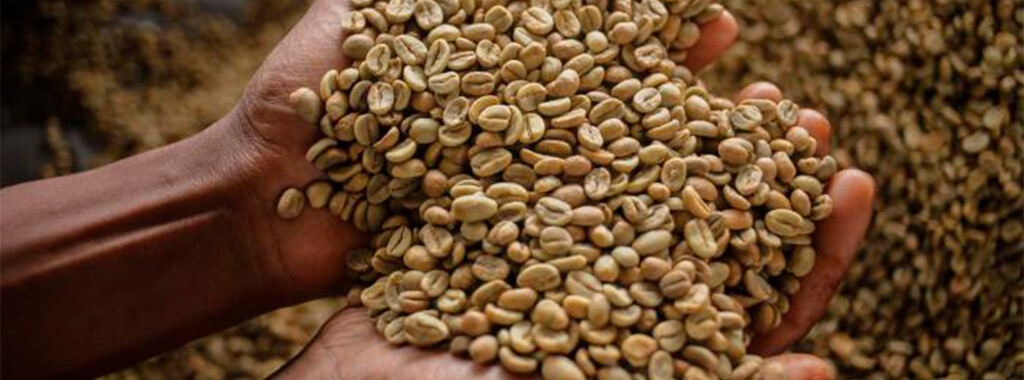A sustainable approach pays off for Indonesian coffee farmers (and nature)

Supporting sustainable agriculture
Agriculture is vital for the population on the Indonesian island of Sumatra. But at the same time it threatens the unique biodiversity of the region. Sioen supports the NGO Rikolto via “Entrepreneurs for Entrepreneurs” (in the text referred to as OVO). Together with coffee farmers, it is investigating the added value of 'models for payment for ecosystem services'. In short: if farmers grow their crops in a sustainable way, they receive a reward.
The challenge
Sumatra is ravaged by deforestation. Every day, a piece of rainforest the size of a football field disappears. The causes: the higher demand for tropical wood, ever larger palm oil plantations and the lack of sustainable agricultural practices among farmers.
Exhorting farmers to stop clearing the rainforest does not work. As much as 45% of the population derives its income from agriculture. Moreover, agricultural yields are low, so farmers continue to expand their land wherever they can.
Reconciling agriculture and biodiversity
A different approach is needed. "That is why the NGO Rikolto has been joining forces with local coffee farmers since 2017," says Björn Macauter, general manager at OVO. "Their yields have been declining for years, and getting a decent income is a daily struggle there. Rikolto developed Payment for Ecosystem Services (PES) systems. The concept: the farmers learn sustainable agricultural practices that maintain the environment. These increase productivity and quality.
Moreover, the farmers receive a reward for applying these sustainable practices. "That is not necessarily money: investments in local infrastructure, sowing equipment, a higher selling price or support in the area of management are also among the options. Rikolto also brings local coffee companies into contact with buyers on the Indonesian market. Women and young people in particular are at the heart of these businesses.
The impact
Government partners or private actors who benefit from the preservation of ecosystems in the region are responsible for the rewards. Close cooperation with local authorities is therefore crucial for long-term impact and sustainability. Indeed, the planned PES systems must be embedded in local policy.
The approach is already bearing fruit. "At the start of the project in 2017, 184 farmers were involved. By 2021 - when the project ends - this will have grown to 1 400 farmers. Of these, 1 in 3 is under 35 years of age, almost 1 in 4 is a woman. In addition, 5 454 family members of the coffee farmers will reap the benefits of the stable income. Think of sufficient food, decent housing and a chance at education."
A heart for Indonesia
This project is in line with Sioen's vision: doing business with a sustainable impact, both on the environment and on society. And that based on the Sustainable Development Goals (SDGs) of the United Nations.
Sioen also has a close link with Indonesia, where we have a production plant. We offer above-average working conditions there, which raises the general standard of living. Not only in terms of wages, but also in terms of health and safety. By supporting the Rikolto project, we extend corporate social responsibility beyond our production site.
SDGs
In 2015, all member states of the United Nations accepted the Sustainable Development Goals (SDGs). These goals are to end poverty, protect the planet and achieve peace and prosperity for all by 2030. As a global industrial player, Sioen also wants to contribute to the realisation of these goals.
By supporting this project of Rikolto, SDG 1 (no poverty), SDG 2 (no hunger), SDG 3 (good health and well-being), SDG 5 (gender equality), SDG 12 (responsible consumption and production) and SDG 13 (climate action) are fulfilled.
OVO
Entrepreneurs for Entrepreneurs, or OVO for short, promotes sustainable economic growth in low- and middle-income countries. How? By supporting local entrepreneurship. After all, OVO is convinced that social and sustainable enterprises are an important motor to increase the standard of living of the local population.
OVO focuses on financing sustainable business initiatives and NGO projects. After all, greater financial strength results in faster growth. In addition, the organisation attaches great importance to knowledge transfer between Belgian companies and entrepreneurs. This can be in the field of business management as well as technical support. To that end, OVO develops an expertise network.
OVO works closely together with 7 Belgian NGOs, among which Rikolto. This organisation - formerly Vredeseilanden - helps farmer families to market a quality product and to get a fair price for it. Their incomes are higher, lifting them out of poverty. Moreover, they provide the world with food sustainably.

